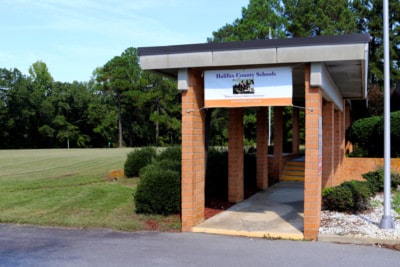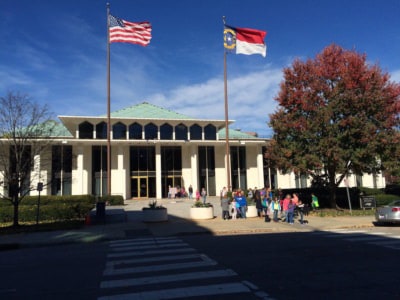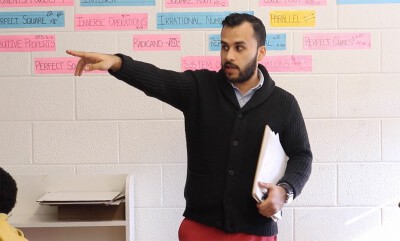

“Education is the most powerful weapon which you can use to change the world.” Nelson Mandela
Over the past century, education has fundamentally changed how people think and how people perform in the workplace. With each passing year, higher education becomes less of a luxury and more of a necessity. According to a study by Georgetown University, 65 percent of jobs in the economy will require training beyond high school by the year 2020. Locally, statistical evidence from the U.S. Census Bureau shows that there is an alarming deficit, with only 39.7 percent of North Carolina residents attaining postsecondary education.
In 2011-2012, out of two million undergraduate students in the United States, 11.1 percent were identified as having a disability (National Center for Education Statistics). The Americans with Disabilities Act (ADA) of 1990, as well as Section 504 of the Rehabilitation Act of 1973, protects these students from discrimination by both government and private entities. Still today, a large portion of undergraduates with disabilities is overlooked within our state and beyond. In an article on diversity in higher education, Lauren McLarney, a Governmental Affairs Specialist for the National Federation of the Blind, claims there is an issue of supply and demand. McLarney emphasized, “Until there is widespread demand, the market will not produce accessible technology like we want them to.”
Fortunately, there are still instances where disabilities do not hamper success in the classroom. Kathryn Webster, a senior in the School of Business and Statistics at Wake Forest University, has witnessed this firsthand.
Kathryn has spent her time at Wake Forest making her vision for the future possible. Kathryn is blind and entered Wake Forest with high hopes of becoming an actuarial scientist upon graduation. However, pursuing a path in this field requires higher levels of math and courses that are visually rich. Without any documented blind Actuaries to learn from, Kathryn, undeterred, took it upon herself to forge a path for future blind students.
Kathryn knew she could not tackle this task alone. Understanding the importance of collaboration and teamwork in academia, Kathryn contacted Dr. Michael Shuman, Director of the Learning Assistance Center and Disability Services at Wake Forest University, to initiate conversation regarding equal access to her course materials. Shuman saw the need, but the challenge was immense. Shuman and Kathryn needed to ensure not only success in the classroom but also full comprehension of the material presented, as print-disabled students generally require additional attention to effectively grasp the material covered in visual mathematics courses. But the pair persevered.
Once enrolled in statistical courses for her spring semester, Kathryn was introduced to Dr. Rob Erhardt of the Mathematics Department, a professor who would play a key role in her academic and professional success. Faced with many obstacles, Kathryn, Shuman, and Erhardt utilized individual strengths to develop a solution to an unanswered question: How can a blind student succeed in high-level statistics courses? Even with extensive research, they found no prior examples to reference in accomplishing these objectives. So, these three individuals quickly became pioneers.


Logistically speaking, a Braille textbook was out of the question on account of size and feasibility. “We had to piece together a way for Kathryn to analyze data in visual graphics,” says Shuman. “If it had been done before, we were not finding it.” Through countless trial-and-error attempts at solutions, they found a feasible alternative with many parts. For Kathryn to read her assignments, complete tests, and submit individual work and projects, the complex mathematical language LaTeX would be used. LaTeX allows Kathryn to read and write mathematics in computer science code. “LaTeX is essentially strings of code a mathematician uses to make equations and problems appear like they do in a textbook,” Shuman explains. Kathryn also uses a Braille embosser, which creates physical representations of visual data. “I can feel the overall shape of points and then make a decision on what the data shows,” Kathryn says. Together, the three of them found an efficient way to make Kathryn’s vision of her future become a reality.
“Accessibility is not a formulaic science, but an art,“ says Dr. Manju Banerjee, Vice President and Director of the Landmark College Institute for Research and Training, a college that specializes in crafting effective learning approaches for students who learn differently.
Together, this team from Wake Forest—an administrator, a professor, and a student—discovered the art necessary to master statistics. Their collaboration should not be a rare instance; instead, all print-disabled students deserve the time and energy invested in Kathryn’s success. Recognizing the power of education, Wake Forest University has taken that first step in ensuring success for all students, regardless of their disability. Kathryn has now acquired the necessary tools to compete equally in her academics, as well as in the workplace.
As a result of the perseverance and resilience of Kathryn and the faculty at Wake Forest, she has not only been able to succeed but thrive in the university environment. Her accomplishments and involvements on campus include President’s Aide, Chair of the Volunteer Service, Treasure of Student Government and keynote speaker for the Wake Will Campaign. Additionally, off-campus, she is the Treasurer and Secretary, Fundraising Chair and Web Master for the National Association of Blind Students.
“I would not be where I am today—an intern at SAS, the largest statistical software development firm in the world—without the effort, willingness, and understanding of Wake Forest administrators and professors,” says Kathryn. Blindness has not held Kathryn back, and it should not hold any student back. Education is the foundation for success; therefore, it is society’s responsibility to recognize the importance and value of accessible education for every individual.





